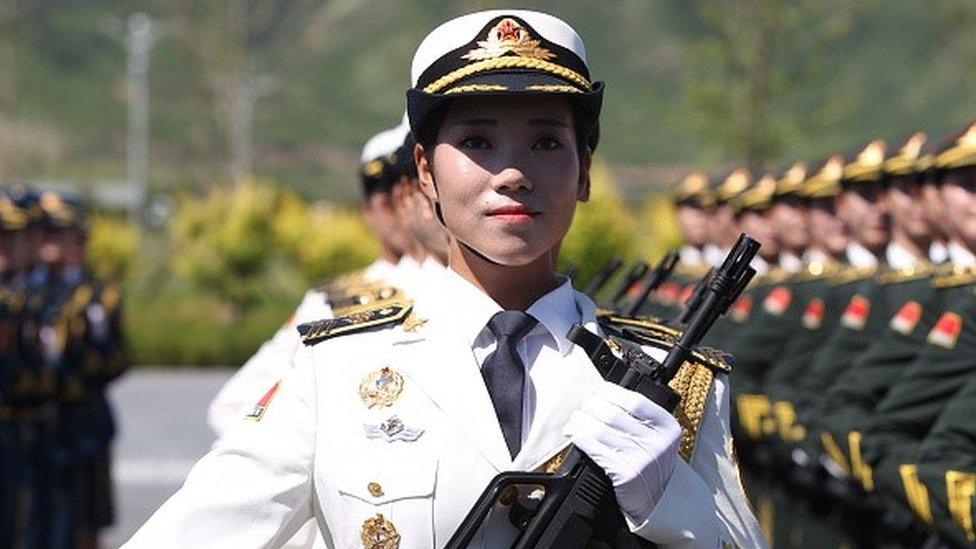China seeks 'new model' for relations with US
- Published
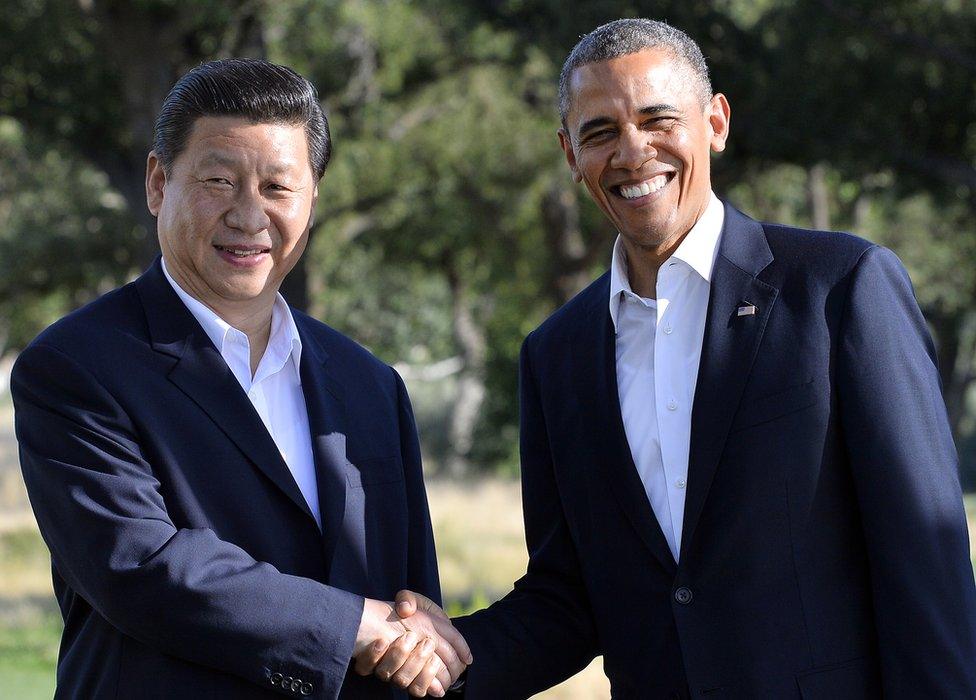
Do you have expectations of this week's summit between President Obama and President Xi? If so, I suggest you lower them.
The sombre fact is that despite the enormous range and complexity of the US-China relationship, it is becoming ever harder to manage. The smiles and ceremony of a 21-gun salute and state dinner will conceal gritted teeth and crossed fingers.
A game of brinkmanship is afoot and on cyber-hacking and contested atolls, it would need a reclamation project bigger and swifter than the one under way in the South China Sea for guest and host to find a piece of common ground to stand on.
But spin it another way and there should be something to celebrate.
Four and a half decades, five Chinese communist leaders, eight American presidents, and a transition from a world in which China is isolated and marginal to one in which it is increasingly able to meet the United States on equal terms.
And through it all, the US-China relationship has broadly held to the course that President Nixon set out in 1972 as he prepared to travel to Beijing to end two decades of enmity:
"The government of the People's Republic of China and the government of the United States have had great differences. We will have differences in the future. But what we must do is to find a way to see that we can have differences without being enemies in war."
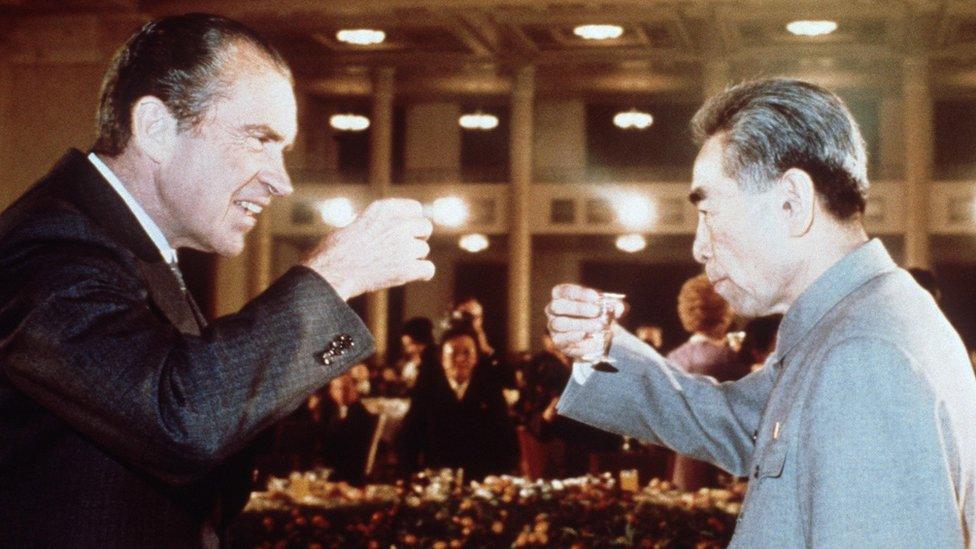
Richard Nixon shares a toast with Chinese PM Zhou Enlai in Beijing in 1972 during the first visit by a US president to the People's Republic of China
Forty-three years later an ambitious Chinese leader is coming for his first state visit in the opposite direction and the challenge is still the same. But now the stakes are even higher for this relationship and it has all the advantages of experience and proven resilience. What makes it so hard then?
'Properly manage differences'
Only last week, President Obama issued a blunt warning to China on cyber-hacking: "There comes a point at which we consider this a core national security threat… we can choose to make this an area of competition, which I guarantee you we'll win if we have to."
Only a scrambled visit by China's security chief for what the White House described as "candid, blunt discussions" seems to have averted American sanctions.
Meanwhile, in the South China Sea, the latest satellite imagery from this month suggests that even during a summit countdown, Beijing is ready to defy American warnings and possibly even renege on its own promises to continue reclamation work to turn contested atolls into military outposts.
Is President Xi about to waste a huge opportunity? Ahead of the state visit he said: "Both sides must accommodate each other's core interests, avoid strategic miscalculation, and properly manage and control differences."
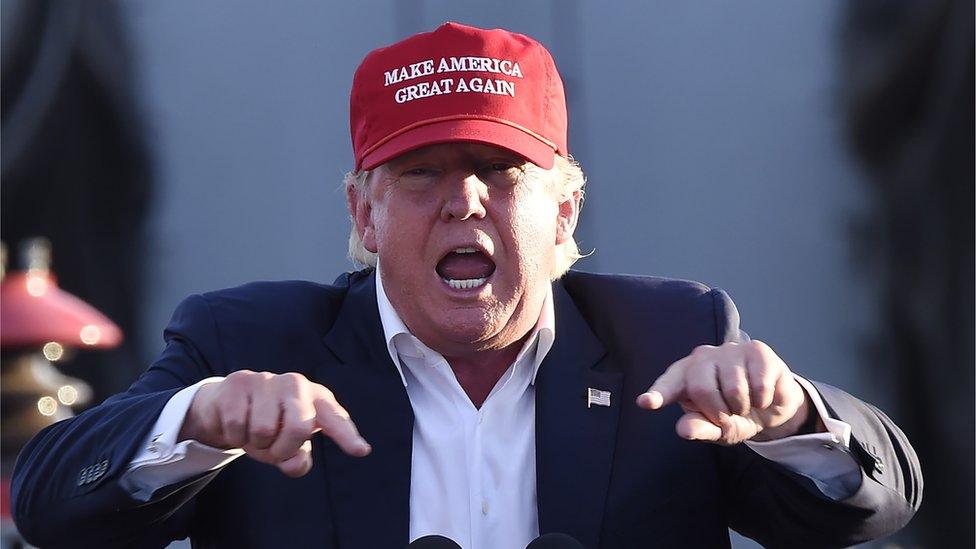
Donald Trump has spoken of China stealing American jobs
But he needs a much, much better speech writer if he is to get heard amid the US media frenzy of a presidential campaign and a papal visit. Already Republican candidates led by Donald Trump are lining up to complain that China is stealing American jobs and some have said President Xi's visit should be cancelled or downgraded.
US public opinion is increasingly negative on China. President Obama told the media China's peaceful, orderly rise is in the US's interest and good for the world.
But President Xi urgently needs to reach out to American politicians and public to explain how it is in the US's interest. A mix of reassurance, vision and rigour are required, and a measure of charm would no doubt help.
But with a schedule focused on closed-door sessions with big business and tightly choreographed photo opportunities with tame members of the American public, it looks as if President Xi has opted for a risk-averse strategy with minimal substance and candour.
Return to form
Don't forget this is the man with the Chinese Dream, a plan for what he calls "the great rejuvenation of the Chinese nation".
Implicit is the argument that a great China is not a novelty but a return to form.
For most of the past 2,000 years, China's economy has accounted for between a quarter and a third of world output and after traumatic shocks delivered by outsiders in the 19th and 20th Centuries, China is on track to overtake the US within the decade and regain its status as the world's biggest economy.

China wants a foreign policy that reflects its economic rise
What's more, China is intent on building military force and diplomatic clout to match its economic might. The swiftest, surest and cheapest way to all three is through US co-operation, and, sound and fury notwithstanding, it has come to count on that co-operation, at least in the economic sphere.
Without American help, how could China have become the world's largest manufacturing and trading nation in such breathtakingly short order? Without American help how can China confront the daunting economic challenges it faces today?
But expect no warm speeches on that score from President Xi in Washington.
Model v dream
Deaf to American concerns about market access or technology theft, the Chinese narrative of the relationship presents a version of itself as a much-maligned partner, uncomplainingly creating wealth and bankrolling spendthrift American consumers. China does not export its ideology or send troops abroad, it points out.
President Xi's preferred slogan for the relationship involves not a dream but a model. He raised it again on the eve of the summit, "the new model of great power relations". This is shorthand for a future in which the US assists China's inexorable advance in order to avoid the wars and convulsions which have accompanied the rise of other great powers in world history.
Seen from inside his model, the US record is far from benign. Instead, the US threatens China's political system by pushing democracy, undermines its territorial integrity by supplying arms to Taiwan and schemes to contain China by surrounding it with American alliances and military deployments.
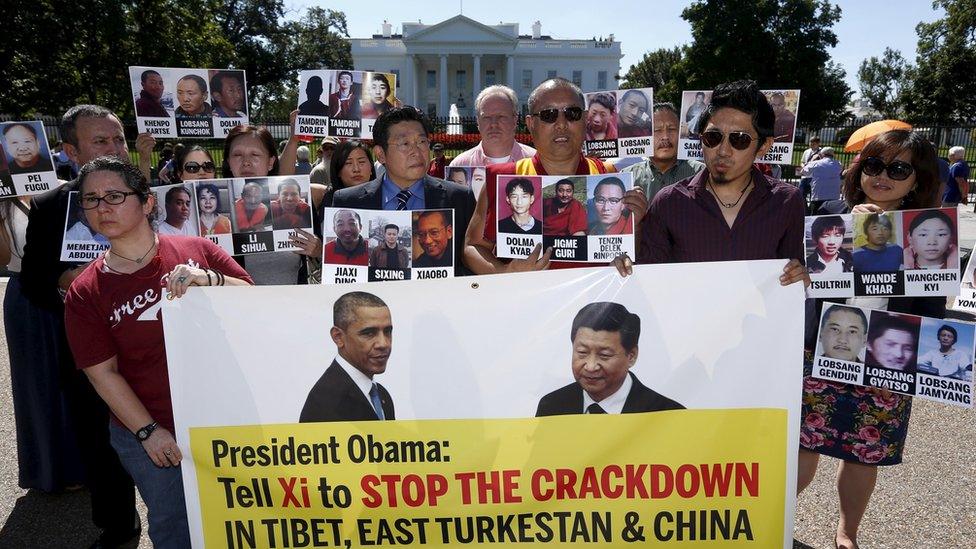
Activists want President Obama to call on President Xi to halt the crackdown on Tibetans and Uighurs, and civil society in China
In fact, part of Mr Xi's dream is that a rejuvenated China will no longer need to put up with an American security order in Asia at all.
But Americans are famous dreamers too.
And especially since China's opening up and integration into the world economy, many have hoped that in Beijing they might one day have a democratic partner and "responsible stakeholder in keeping the world safe".
Hostilities
That American version of the Chinese dream is an affront to Mr Xi's own and as he goes through the protocol motions on the American red carpet, it is no exaggeration to say that he sees his hosts as outright ideological enemies.
He is at least as hostile to their politics as Chairman Mao was in the days of Nixon's visit, probably more so because of the close and present danger those politics present in a globalised world.
In his first three years in power, President Xi has used anti-corruption and ideological campaigns to stiffen the sinews of the Communist Party and buttress one-party rule.
He has censored the discussion of universal values like democracy and freedom of speech, locking up academics, human rights lawyers, civil society activists, journalists, Christians and bloggers.
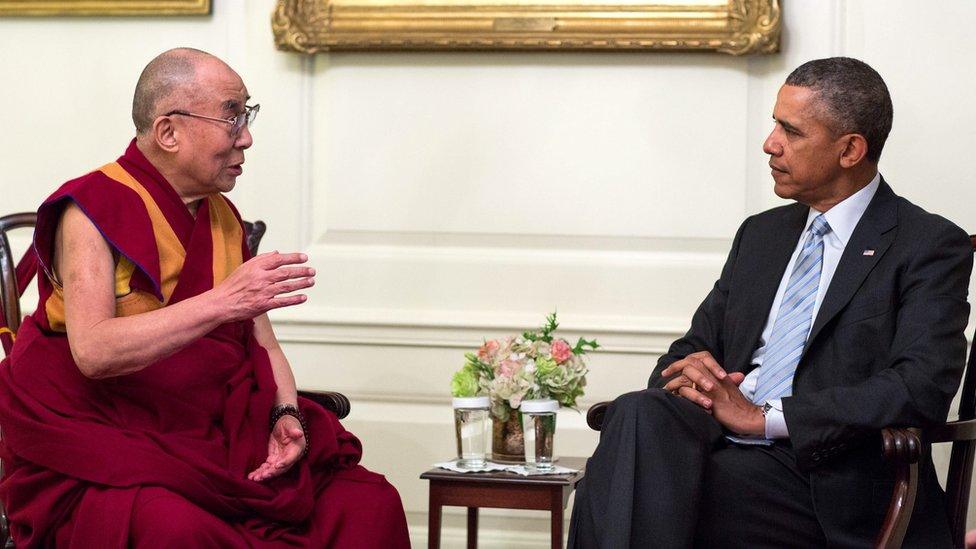
Chinese media has been critical of President Obama's meetings with the Dalai Lama
Chinese propaganda teaches that the US is just the latest in a long line of hostile foreign powers trying to keep China down with a range of ideological weapons including meddling in Hong Kong and befriending the Dalai Lama.
President Xi makes no apology for his politics. "Shoes do not have to be the same but simply to fit the wearer," he says. He is an authoritarian by conviction who believes China needs discipline and a sense of shared mission to realise its "great rejuvenation".
All of this is admittedly a difficult message to articulate for an American public. But some truths should be attempted for the sake of candour and connection.
President Xi could say that China still has enormous challenges at home and will avoid clashes with the US where possible. But that at the same time he wants a foreign policy that reflects the reality of China's rise. And that on a range of issues, including rules for investment and climate change, he will co-operate with the US to the advantage of both countries.
He would be wise to attempt a much more nuanced and persuasive case on areas of competition like cybersecurity and the South China Sea. And he needs to show that he can listen and respond to the concerns of Americans. If not always with agreement, at least with understanding.
Now that would truly be powerful and might even presage a "new model of great power relations".
- Published17 September 2015
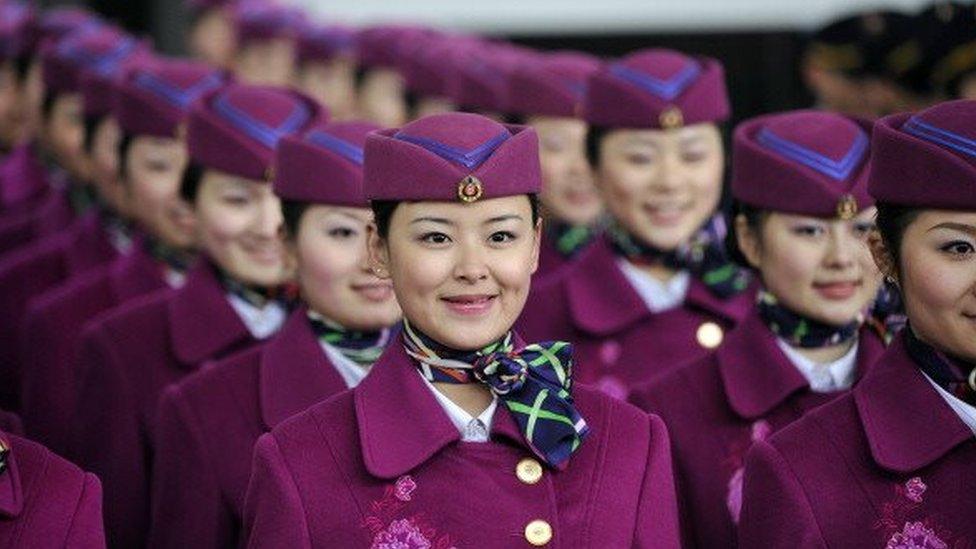
- Published3 September 2015
- Published3 September 2015
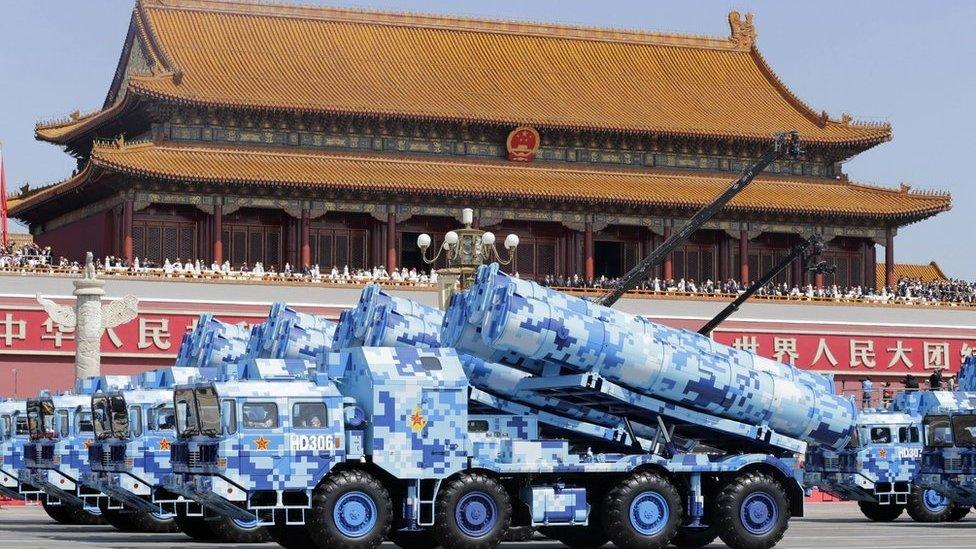
- Published2 September 2015
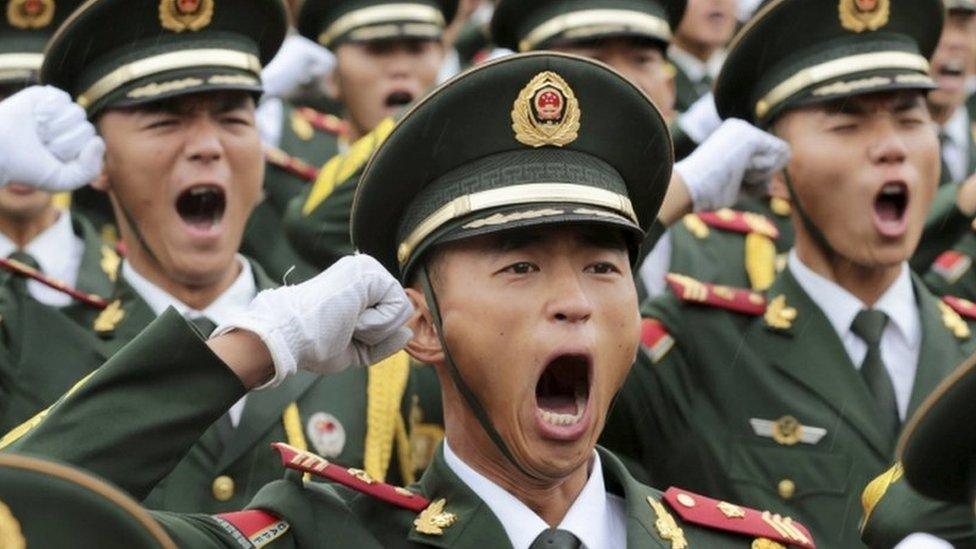
- Published1 September 2015
